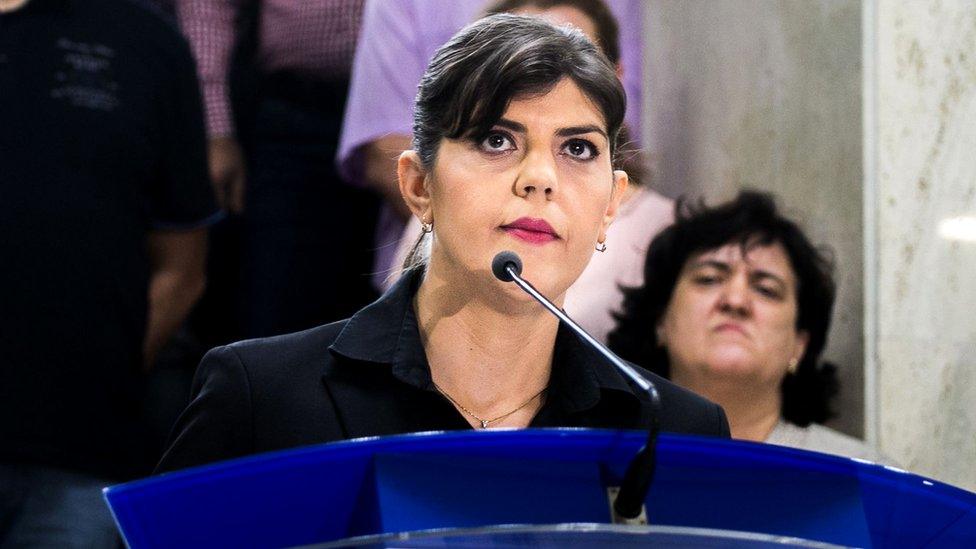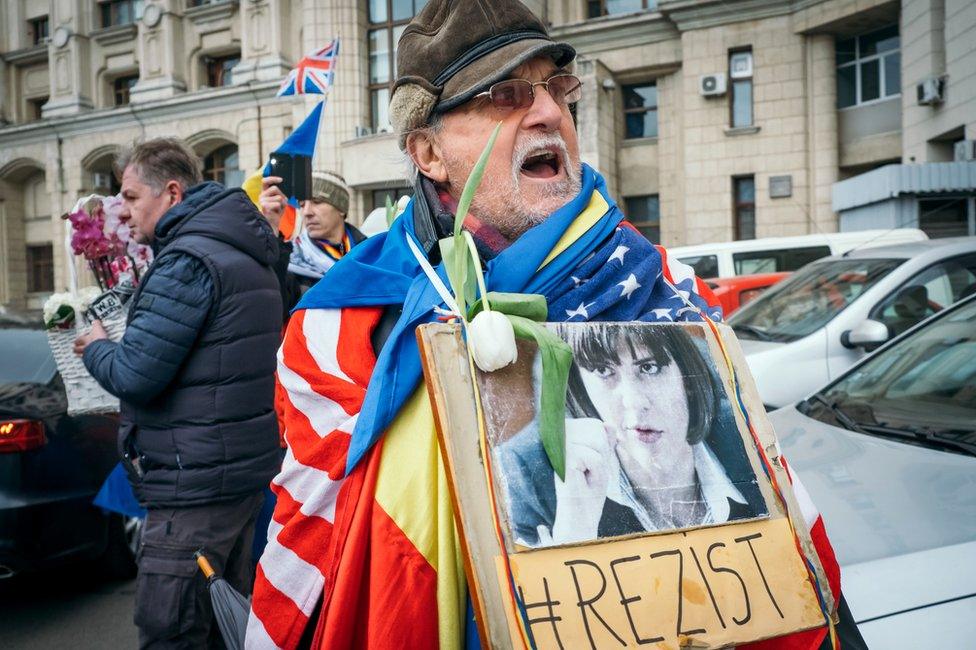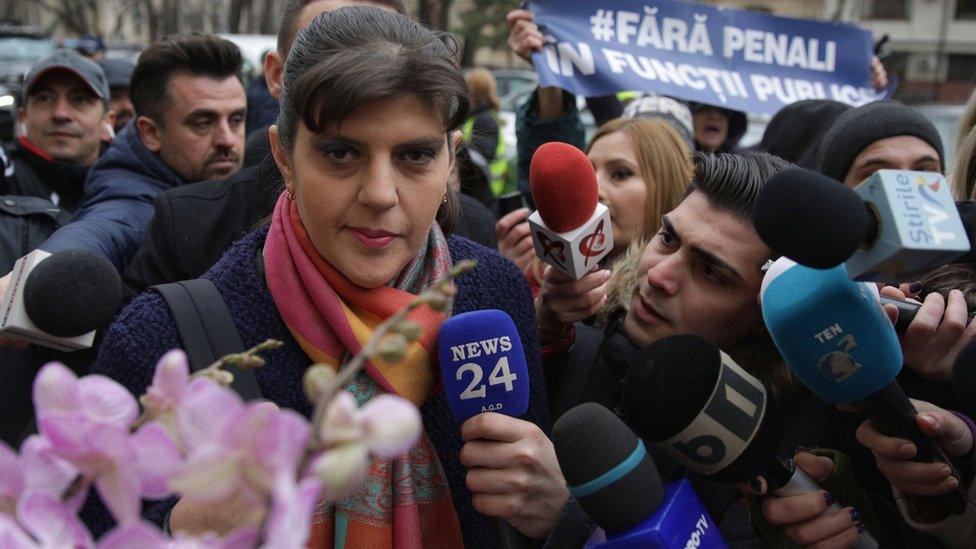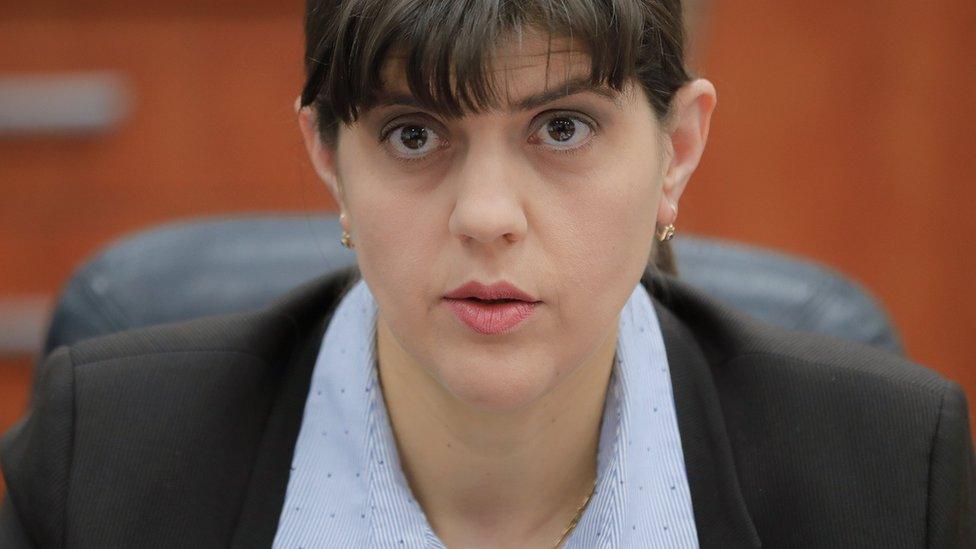EU backs Romania's corruption fighter as new chief prosecutor
- Published

Ms Kovesi made a name for herself tackling corruption among Romania's political class
Laura Codruta Kovesi, Romania's former anti-corruption chief, looks set to become the EU's top prosecutor, despite opposition from her own government.
Ms Kovesi gained the backing of most member states to head the new European Public Prosecutor's Office on Thursday.
A European Council vote is expected to confirm her appointment within weeks.
The 46-year-old became a thorn in the side of Romania's political class while leading the country's powerful Anti-Corruption Directorate (DNA).
Ms Kovesi took charge of the DNA in 2013 and in the years that followed, conviction rates rose sharply in one of the EU's most corrupt countries.
Then, in July last year, she was sacked by the Romanian government.
Speaking to reporters on Thursday, Ms Kovesi said the development was "an important step", but added: "We will have to wait for the official decision."
The European Council, which has previously backed Ms Kovesi's appointment to the new role, is expected to vote in her favour.
Her government's deadly enemy
A talented basketball player in her youth, Ms Kovesi became a general prosecutor at just 36.
During her five years as anti-corruption chief, she put 68 high-level functionaries on trial, including 14 government ministers or ex-ministers and 53 deputies from both houses of the Romanian parliament.
By the time she was forced out of the job by the governing Social Democrats (PSD), 37 of those politicians had already been convicted, and most of the other cases were ongoing.
The PSD consider her their enemy, even though public officials from all parties were prosecuted.

Ms Kovesi's supporters rallied when she was questioned over allegations of false testimony
Eventually, after a long battle, the government forced the president to fire her.
Ms Kovesi stood accused of abusing her office and over-use of wire-tapping facilities from the secret services; her district prosecutors were accused of pressuring witnesses.
A fraud inquiry was launched against her, which she dismissed as part of a smear campaign.
Ms Kovesi's ascent to head the EU's new prosecutors' office has been meteoric, but not without controversy. Loved by European liberals, she is hated by some of Europe's most authoritarian governments, including Hungary's nationalist ruling Fidesz party.
Her new office will place her at the centre of disputes about the future reach of the EU.
"I will not answer to the critics. I will answer to the citizens," she said in a 2017 BBC interview.

Why does Europe need a chief prosecutor?
By Nick Thorpe, BBC News Eastern Europe correspondent
So far, 22 out of the EU's 28 states have agreed to join the European Public Prosecutor's Office. Hungary is among those that reject it as an infringement of their national sovereignty.
Its main purpose is to combat complex fraud cases.
How complex? Imagine a truck loaded with sunflower oil rumbling over a sturdy steel river bridge from one EU country to another.
Both are members of Schengen, the customs-free European Union trade zone, and the old border control buildings have broken windows, empty except for cobwebs.
There are no border police or customs officers in sight. The truck parks in a lay-by.
A company accountant fills out VAT refund forms in country A, because the oil has been "exported". VAT ought to be paid in country B, by those who sell it.
But later that day, the driver calmly drives his truck back without unloading it.
The oil finds its way on to supermarket shelves back in country A, tax-free.
It's part of everyday VAT fraud, which costs EU countries an estimated €50bn (£43bn; $56bn) a year. A US diplomat based in Hungary found discrepancies, external between imports and exports totalling $3.37bn in 2015 alone.
Investigating this is complex and requires mountains of translated documents and time-consuming work for police, customs and judiciary.
National customs offices are also sometimes "discouraged" by those in power.
The EU's anti-fraud office, Olaf, has a staff of only 100 and over half its requests for investigation are rejected by national prosecutors.
The new prosecutor's office will not only target suspect VAT transactions, but also the equally complex issue of public procurement tenders for EU money - to identify contracts going to business figures close to political parties.
And Ms Kovesi, who has already taken on the powerful in her home country, may be leading the charge very soon.
- Published9 March 2019

- Published9 February 2017
